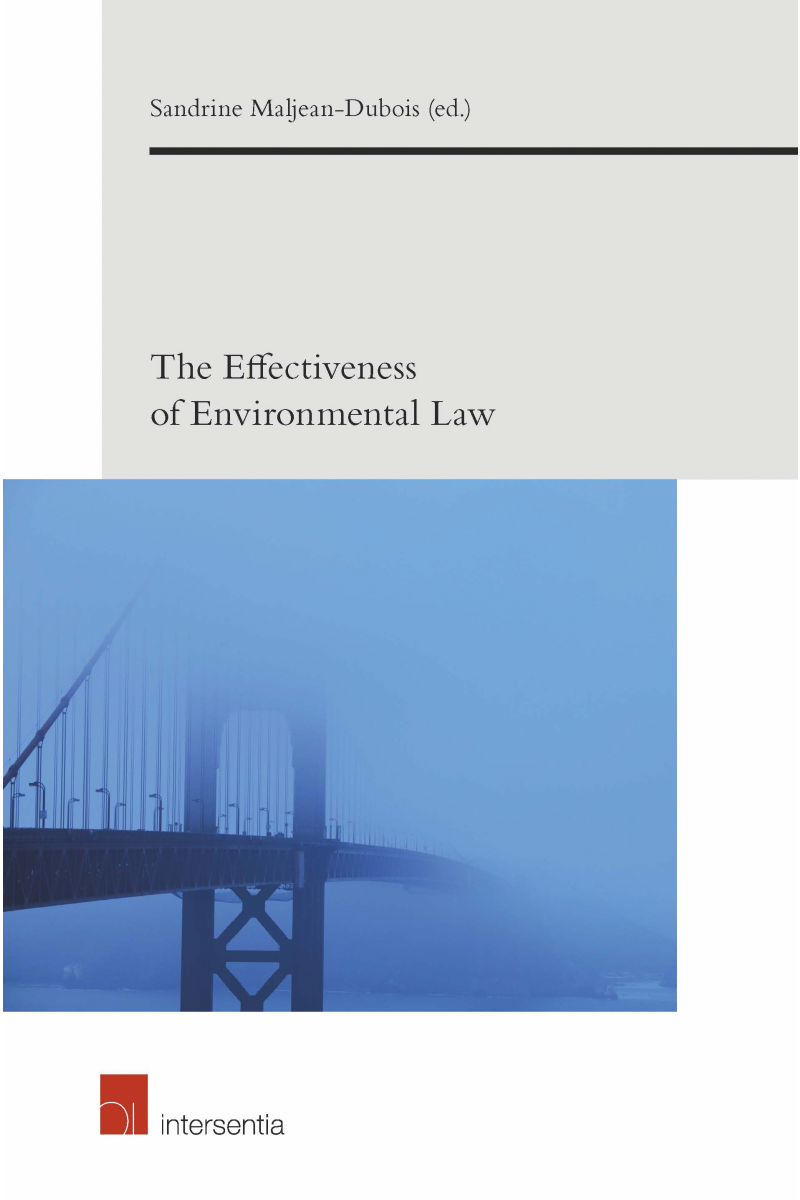 maestro
mastercard
visa
maestro
mastercard
visa

The Effectiveness of Environmental Law

This book is the third volume in the European Environmental Law Forum (EELF) Book Series. The EELF is a non-profit initiative of environmental law scholars and practitioners from across Europe aiming to support intellectual exchange on the development and implementation of international, European and national environmental law in Europe. One of the activities of the EELF is an annual conference. This book bundles 15 contributions from those presented during the Third EELF Conference in Aix-en-Provence, hosted by the CERIC, Aix-Marseille University, from 2 to 4 September 2015.
The central topic of the book is the effectiveness of environmental law. Indeed the impressive developments in environmental law in recent years have not always been matched by corresponding improvements in environmental quality. The threats to our environment and, by extension, to human health have never been so numerous or so serious. Paradoxically, the effectiveness of environmental law has been a long-neglected issue. This book offers a fruitful and stimulating dialogue between practitioners and academics, from varied countries and varied fields, combining empirical and theoretical approaches to the topic. Suggestions for improving the effectiveness of environmental law range from classic – yet still necessary – approaches working within criminal and administrative channels, such as civil sanctions, liability rules and strengthening the regulatory structure and the role of judges, to more innovative methods involving public participation, collaborative or hybrid governance and private environmental enforcement.
Dr. Sandrine Maljean-Dubois is a professor at the CNRS (Centre national de la recherche scientifique) and teaches international environmental law at the Faculty of Law and Political Sciences of Aix-Marseille University. She has edited several books and a large number of articles in this field, focusing in particular on biodiversity, non-compliance mechanisms and climate change negotiations. She is a member of the advisory board of the European Environmental Law Forum (EELF).
| Type of product | Book |
|---|---|
| Format | Paperback |
| EAN / ISSN | 9781780684673 / 9781780687384 |
| Series name | European Environmental Law Forum |
| Weight | 574 g |
| Status | Available |
| Number of pages | xii + 348 p. |
| Access to exercice | No |
| Publisher | Intersentia |
| Language | English |
| Publication Date | Jun 8, 2017 |
| Available on Strada Belgique | No |
| Available on Strada Europe | No |
| Available on Strada Luxembourg | No |
Downloads
- Table of Contents and Preliminary Pages
- Introduction. The Effectiveness of Environmental Law: A Key Topic
Sandrine Maljean-Dubois - PART 1. MEASURING AND ASSESSING EFFECTIVENESS
- Chapter 1. The Climate Resilience of Critical Infrastructural Network Sectors. An Interdisciplinary Method for Assessing Formal Responsibilities for Climate Adaptation in Critical Infrastructural Network Sectors
- PART 2. IMPROVING EFFECTIVENESS; 2.1 BETTER LEGISLATION
- Chapter 2. The Effectiveness of Payment for Ecosystem Services: a mix between a gradient model of public intervention and an effective normative framework
- Chapter 3. The Effectiveness of Environmental Law through Contracts
- Chapter 4. Legal Weaknesses and Windows of Opportunity in Transnational Biodiversity Protection: as Seen through the Lens of an Ecosystem Approach-Based Paradigm
- Chapter 5. Better Expertise through Institutional Linkages. The Case of the Mediterranean Basin
- Chapter 6. Environmental Dignity Rights
- Chapter 7. The Environmental Protection of Traditional Knowledge and the Active Participation of Indigenous Peoples in the Planning, Management and Decision-Making Processes as Means of Improving the Effectiveness of Environmental Law
- Chapter 8. Promoting Electricity from Renewable Energy Sources in France. Is French Law Appropriate for Achieving the Objectives?
- Chapter 9. Changing Patterns of International Environmental Law-Making: Addressing Normative neff ectiveness
- Chapter 10. The Effectiveness of EU Nature Legislation: a long battle to secure supporting sectoral policies
- 2.1 BETTER IMPLEMENTATION
- Chapter 11. Towards More Effective Protection of Water Resources in Europe by Improving the Implementation of the Water Framework Directive and the Aarhus Convention in the Netherlands
- Chapter 12. Environmental Inspectors and Public Prosecutors. Is Sharing Information Always Useful?
- Chapter 13. Environmental Damage Caused by Oil Exploitation in Brazil. The “Conduct Adjustment Agreement” (TAC) as a Means to Circumvent Civil Liability Ineffectiveness
- Chapter 14. Can Multilateral Development Banks be More Environmentally Effective? Perspectives from the Practice of International Accountability Mechanisms